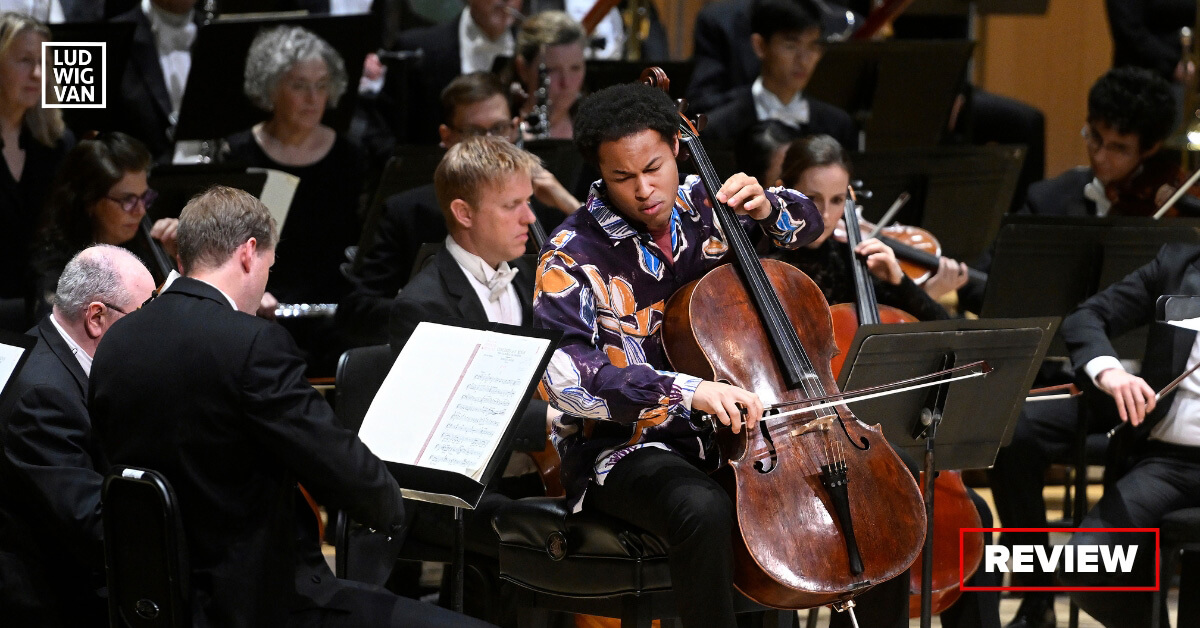
Following a triumphant Mozart Requiem, the Toronto Symphony Orchestra goes from strength to strength with a program of Elgar, Vaughan Williams and Kulesha. It had its first of two performances last evening. For many in the audience, the main attraction was the TSO debut of star British cellist Sheku Kanneh-Mason.
To the general public, Kanneh-Mason is likely remembered for his performance at the wedding of Prince Harry and Meghan Markle in 2018. At the tender age of 19, this high-profile engagement propelled him to popular stardom, appearing on talk shows and the like.
Lest you think he’s a flash in the pan, Kanneh-Mason is the “real deal” musically. Before his Royal gig, he won a BBC competition in 2016, has since toured internationally to great success and made two acclaimed recordings for Decca. Without a doubt, he’s a cellist of immense talent, uncommon musicality, and impressive power of communication. For more, read our interview with him here.
This week, Toronto music lovers get to experience his artistry firsthand in his TSO debut. It marks his return to Toronto after a memorable Koerner Hall recital he gave with is sister, pianist Isata Kanneh-Mason last season. Last evening, he was the soloist in the Elgar piece in the second half. Roy Thomson Hall the fullest I have seen it since the Pandemic, a gratifying sight.
But first thing first. The concert opened with TSO Conductor Emeritus Peter Oundjian in the beloved Vaughan Williams piece, Fantasia on a Theme by Thomas Tallis. Oundjian led the TS forces in a hushed and ethereal reading of the beautiful score for string orchestra. All the principals really shone in their brief moments in the sun. I particularly loved the viola on this occasion, a lovely, if quiet opening of the program.
If the Vaughan Williams piece was somewhat lacking in theatricality, the Fourth Symphony by Canadian composer Gary Kulesha sure made up for it. One of the best-known and respected of Canadian composers, Kulesha has had a longstanding association with the TSO, where he is Composer Advisor. Two of his three previous symphonies were premiered right here.
As “new music” goes, the Fourth Symphony is tonal, highly accessible, with a clear musical structure, characteristically new music but very accessible even on first listening. I was grateful that it doesn’t have the wild edginess and head-scratching extramusical sounds that one sometimes encounters in new compositions these days. I found myself quite taken by it and look forward to hearing it again.
After a short intermission came the centrepiece of the evening, the Elgar Cello Concerto in E Minor, Op. 85. Premiered in 1919 when the aftermath of WWI was still haunting England, the cello concerto is autumnal and sad, a work that touches the heart. It was also Elgar’s last great composition. Personally speaking, I grew up with the incomparable Jacqueline du Pre’s two versions, and I tried to find as many other performances as I could. Together with the Dvorak cello concerto, these two are the desert-island cello pieces for me.
It always astounds me that a work as introspective and world-weary as the Elgar would attract so many young musicians, the likes of du Pre and now Kanneh-Mason – it strikes me as something that would require an older artist, someone with a lengthier lived experience to do it justice. Well, I guess I am wrong! I probably have listened to two dozen cellists playing this live and on recordings, and I admit age doesn’t seem to play a role.
Last evening, from the first note on, Kanneh-Mason’s playing of the opening Adagio transported the listener to another realm, with his combination of the beauty of tone, heartfelt expressivity and technical brilliance. The languorous opening, with the slow buildup to the first orchestral tutti, followed by the bravura display of the quick-silver pizzicato chords, it was an incredible pleasure to the ear. To be honest, I felt a lump in my throat more than once.
Thankfully the audience was exceptionally well-behaved, with only a single lapse of unwanted applause, after the showy pizzicato ending of the first movement. The British Peter Oundjian was in his element with the Elgar, and he led the TS forces with a sure hand, bringing out the inherent beauty and poignancy of the score in no uncertain terms. I, for one, am grateful that Maestro Oundjian is still a frequent guest here.
As expected, the audience gave Kanneh-Mason a huge reception at the end. Yes, standing ovations in North America may be rather overdone, but he totally deserved it. To everyone’s delight, after repeated bows, Kanneh-Mason gave an encore, a lovely, hymn-like melody, which later found out was the Welsh folksong “Myfanwy.” The concert had only about an hour and a bit of music, short by any standard. But it was very sweet to my ears, and it will linger in my memory.
The second and last performance is this evening, not-to-be-missed:
#LUDWIGVAN
Get the daily arts news straight to your inbox.



